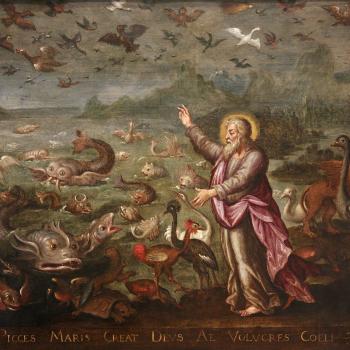
The way so many of us think about morality, the way so many of us think about good and evil, is dualistic. That is, we tend to think good and evil are equal and opposite to each other, making good and evil substantial entities in and of themselves. This leads us to believe that if we do something evil, no good would have led us to act in such a way, nor will any good come out of it. Similarly, if we do something good, our action is assuredly good in cause and in effect. However, the problem is that this turns evil into a substance, which runs contrary to good ontology; evil is not substantial; it is not something which can be seen as equal to and opposite of the good. Rather, evil is a privation of the good. When we act, and what we do is said to be evil, what we do ends up diminishing or corrupting some particular good.[1] For this reason, every evil, every evil action, exists out of and from some good, and indeed, though the act can be said to be evil, examining it will allow us to see that it cannot entirely destroy the good from which it came, and so remnants of that good will remain. “Evil acts in virtue of deficient goodness. For it there were nothing of good there, there would be neither being nor possibility of action. On the other hand if good were not deficient, there would be no evil. Consequently the action done is a deficient good, which is good in a certain respect, but simply evil.” [2]
Whatever good that can be found will obviously be distorted, often taken out of its proper context; what is important for us here is that we recognize that some good remains, and for this reason, we have hope that such good can eventually be used as the foundation by which the greater good can be restored. Every evil act, therefore, has its own counter contained within it, its own antidote, as it were, though of course, this is not to say, because there is some element of the good involved, some good which remains, we are to approve of such acts: far from it. But it does mean we must be careful when we examine any act so that we do not end up denying any good in it, because then, we will not only engage an error associated with dualism, we will promote the elimination of what remains, thus continuing the destruction which the evil began. This can be seen as one of the reasons why St. Thomas Aquinas believed it was important to reaffirm that every act, no matter how evil we can find it to be, contains something good in it:
We must therefore say that every action has goodness, in so far as it has being; whereas it is lacking in goodness, in so far as it is lacking in something that is due to its fulness of being; and thus it is said to be evil: for instance if it lacks the quantity determined by reason, or its due place, or something of the kind. [3]
Certainly, it can be difficult for us to discern what that goodness is, for when we realize something is evil, we normally notice the harm which has been done. But, recognizing that there is some good involved in every act, including those which are said to be evil, does not mean we can then suggest such good is enough to justify the evil which has been done. Of course it does not. The whole point is to affirm and support what is good, both before we act, but also after, so as to make sure we do not further diminish the good in the world.
We naturally pursue what we think is good; no one desires to be evil. Everyone sees the good which the desire and think that means, because it is good, it is fine for them to act upon their desire and do what they can to attain that good. While it is true, the good remains good, it is easy to have some particular, lesser good, direct our act so that we end up doing something which creates more harm, more pain and suffering in the world, than if we didn’t pursue it. Indeed, all evil takes some particular good and removes it from its proper context, from the greater good, and in this way weakens and undermines it as it no longer has the greater good to hold it up and preserve it. As people who do wrong do so thinking they are seeking after what is good, this means there is some kind of ignorance behind their act. If they truly understood what would come out from a certain act, if they understood how it would ultimately cause themselves more grief than happiness, they would not do it. But once someone has made their choice, once some has acted in a certain way, they will be changed by that act, and if what they did was evil, that evil will affect them and their ability to act in the future. If they are not careful, they will end up in a cycle where they seek some lesser good, receive that good, enjoy it for what it is worth, but soon find themselves needing to act to attain it once again, thus finding themselves bound to an endless cycle of actions which likely will satisfy them less and less and make them need to act more and more to receive the good which they desire. This is how habits and addictions form. In this way, desire, ignorance, and the resultant weakness which forms as a result of bad actions, can be said to be poisons which lead us away from the holistic good: “There are three principle evils that corrupt the three foregoing goods, namely, ignorance, concupiscence, and weakness; ignorance of good, concupiscence of evil, and weakness of the human body.” [4]
Nonetheless, the fact that every act, even those which can be said to be evil, are founded upon the good, and still have some element of the good in them, should give us hope that the good which remains after evil is done can become the source and foundation by which the harm done can be overturned. That is, there is hope that such good can be healed. We can hope that evil will not have the final word. Indeed, good, because its source and foundation is in God, is infinite; evil, on the other hand, is not, as its purpose is to corrupt and destroy the good until nothing is left, including itself. Thus, even after it is harmed, the good can rise above the evil which has been done, for, as Ficino said, “Infinite goodness rises far above finite evil.” [5] The corruption of the good will always remain partial, for God, who is the source and foundation of every good, will not allow nihilism to reign supreme. There will always be some element of the good which remains, a good which can then be used to establish a new order to stand against the corruption of evil. God, then, can bring grace to that new order, providing it what is necessary not only for the good to be preserved, but for the good which was lost to be restored, so that things can return to the way they were before being corrupted by evil:
But the goodness of God does not permit a thing to be brought to this point. It disposes all things that fall away so that they occupy their place most suited to them until, by an ordered movement, they return to that from which they fell away.[6]
Thus, when discussing good and evil, we must understand what it is we are discussing. Ontologically, all that exists, insofar as it exists, is good. Evil is nihilistic, it is destructive. It is not substantial, but rather, represents some destruction or corruption of existence itself. Existence is never wiped out. The good is infinite, evil is not. The good will prevail, as existence itself will prevail. Nonetheless, the harm which comes out of evil cannot be denied, which is why it must be fought against and overcome. When we think of evil, when we discuss evil, we must make sure we do not end up establishing a dualistic understanding of good and evil, making evil substantial in itself, for when we do that, we end up calling what is good, evil, allowing existence itself to be evil. Ontologically, the reality is clear. Existence is good. All things which partake of existence partake of the good. This is why, once again, we must understood that when we discuss the cause of evil, it is actually some good, because evil needs the good, but good does not need evil:
I answer that, It must be said that every evil in some way has a cause. For evil is the absence of the good, which is natural and due to a thing. But that anything fail from its natural and due disposition can come only from some cause drawing it out of its proper disposition. For a heavy thing is not moved upwards except by some impelling force; nor does an agent fail in its action except from some impediment. But only good can be a cause; because nothing can be a cause except inasmuch as it is a being, and every being, as such, is good.[7]
Bulgakov is right to bring such analysis to the question of universal salvation and see how the goodness of all things, especially how all things are good in their essence, serves as a reason and justification for a belief in the objective reality of apokatastasis:
Therefore, if we can speak of apocatastasis, then this is only in the sense of ontological anamnesis – in the sense of the beginning, not of the end. In the world nothing is lost and nothing is annihilated except evil, conquered by the power of God and thereby exposed in its non-being. But the history of the world, which is also the history of the Church, is the building up of the kingdom of God, the City of God. And this can be called apocatastasis only in the sense of the universal salvation whose foundation was already laid when all that exists was created. [8]
Universal salvation is objectively true because all things contain goodness in them, and so God will work to preserve and restore all things, using the good which remains to restore them back to where they were before they became corrupted. This is achieved by Christ, as he overcomes all the harm which sin has caused in the world. In this way, all things will find themselves objectively restored; what happens after that is beyond us. Will those who find themselves restored to their original goodness allow themselves to take in grace and be deified, so as to become something greater? Or will they find themselves only embracing and experiencing the finite share of the good they had been given in their creation, a good which, when experienced in the infinity of eternity, will be stretched out and made thin? While we do not know the answer to this question, we can hope that everyone, once restored to the original good they possessed before sin corrupted it, will allow themselves to be open to and directed by the greater good and so accept the infinite deifying grace they need to make eternity one of beatitude. That is, we can hope, though we do not know, that everyone will be saved, not just objectively, but subjectivity as well.
[1] The corruption and harm to the good has to be significant, for if it were not, we would not be aware of it; and so there can be all kinds of evil which we do not know or understand as being evil.
[2] St. Thomas Aquinas, Summa Theologica. Translated English Dominican Province. II-i.18.1.
[3] St. Thomas Aquinas, Summa Theologica, II-i.18.1.
[4] Richard of St. Victor, “The Book of Notes” in Interpretation of Scripture: Theory. Trans. Hugh Feiss OSB. Ed. Franklin T. Harkins and Frans van Liere (Hyde Park, NY: New City Press, 2013), 300.
[5] Marsilio Ficino, The Letters of Marsilio Ficino. Volume 1. trans. by members of the Language Department of the School of Economic Science, London (London: Shepheard-Walwyn, 1975; repr. 1988), 89 [Letter 44 to Giovanni Cavalcanti].
[6] St. Augustine, “The Way of Life of the Manichaeans” in The Catholic and Manichaen Ways of Life. Trans. Donald a. Gallagher and Idella J. Gallagher (Washington, DC: CUA Press, 1963), 71.
[7] St. Thomas Aquinas, Summa Theologica, I.49.1.
[8] Sergius Bulgakov, “On the Question of the Apocatastasis of the Fallen Spirits ” in The Sophiology of Death. Essays on Eschatology: Personal, Political, Universal. Trans. Roberto J. De La Noval (Eugene, OR: Cascade Books, 2021), 90-91.
Stay in touch! Like A Little Bit of Nothing on Facebook.
If you liked what you read, please consider sharing it with your friends and family!













